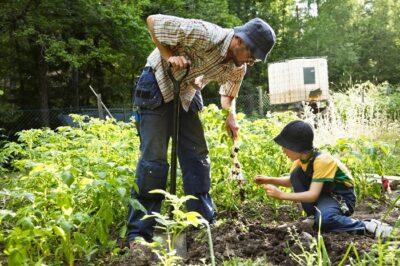|
Listen To The Article
|
Perhaps you’ve been researching the lifestyle of self-sufficiency for a while. You’ve started growing a garden, have a small flock of chickens and have begun living your life in a more frugal manner. So far you’re really enjoying the lifestyle change — but you yearn for more.
Here are 10 ways, in no particular order, you can “level up” how self-sufficiently you live.
1. Completely Move to a New Area
This is an obviously huge lifestyle change but often a common one for those on the path to homesteading and self-sufficiency. You can live fairly independently in an urban setting, but nothing beats having some land for your own purposes, even if it’s just a couple acres.
If you feel stuck in terms of progressing in this new lifestyle, it might be time to consider making a move to a new area. A huge change often will cause massive growth.
2. Set Up a Small Solar Power System
The epitome of independence for some people is to go completely off-grid. For others, going off-grid in everyday life isn’t appealing. If you fall into the latter category you still should invest in a small solar-powered system you can use during power outages or at least carry you through a survival situation.
This system doesn’t need to be huge and it doesn’t have to run your entire house. Rather, this system can be used just to charge batteries and run water pumps and other small appliances. Solar panels are truly a valuable investment in terms of peace of mind and overall ability to live more comfortably when you don’t have power.
World’s Smallest Solar Generator … Priced So Low Anyone Can Afford It!
3. Add a Backyard Apiary
Chickens, rabbits, a couple of sheep or goats and maybe a cow are all common types of livestock for a self-sufficient family. Take the path of producing your own animal-produced foods a step further by keeping bees.
Bees are such amazing creatures that there really is no reason to not keep them. They produce honey, a food that will never spoil. Honey is incredibly versatile, from being used to heal wounds to sweetening up food. It is also a great trading/bartering food item. Bees are also in decline in the wild, which means you’ll not just help your own property’s flora by having them around but also your community’s.
4. Switch to Wood Stove Heat
Specifically, a wood stove that you can cook on, as well. Wood stoves can easily heat an average-sized, well-insulated house. Even in harsh winters you can keep warm without using excessive electricity, except maybe an additional space heater or two in really frigid climates.
Wood stoves can be installed in pretty much any house and don’t require excessive remodeling like a fireplace would. A wood stove can also be taken with you if/when you move.
5. Change Your Diet and Fitness Regimen
One of the most powerful ways to increase your ability to live independently is to change your diet and exercise plan, if your current one isn’t working. The average American has a ridiculous number of health problems, to the point that it is practically normal to show symptoms of some illness. Diet should be a primary concern of anyone trying to live self-sufficiently.
Eating whole foods, particularly those you’ve grown and harvested yourself, is the first step. Eat organically as much as possible. As for fitness, try to just get off your feet more. Walk around, go for a hike, play at the park with your kids. You don’t need to go run a marathon; just make an effort to move.
6. Buy/Collect Non-Powered Hand Tools
Power tools make building and repairs happen much more quickly, but what if you don’t have power? Hand tools will last you for an incredibly long time with proper care, well past your lifetime. Even antique tools you can find at garage sales or thrift shops can be cleaned up and work just fine.
Going out and buying a bunch of tools to replace your power tools isn’t in the budget for many people. Instead, make an effort to collect them as time goes by. In addition to garage sales, you can also check out estate sales, farm auctions, and even eBay.
7. Brush Up Your Trading and Bartering Skills
It’s a bit funny how in today’s world trading and bartering are lost skills. We tend to go to a store and pay the price listed, no questions asked. You can’t really barter with retail stores, but you may be able to with small mom-and-pop shops and you certainly can with private individuals.
Often, you can barter to pay slightly less for items or even produce for sales from people. The worst thing they can say is no, and in my experience, most will be happy to work with you if you don’t try to low-ball them. I’ve also had great success trading items I have for things I need. You just might have something laying around you rarely use that could be of great value to someone else.
8. Make an Effort to Create Community
It is amazing, albeit sad, that many people who live in urban settings have no idea who their neighbors are. Many people are so busy and caught up in their own lives that they don’t really make an effort to learn about each other. This isn’t as much of a problem in rural areas but nonetheless, getting to know your neighbors and create a community is important.
Building a repertoire with other survivalists develops camaraderie, which helps you learn new skills and share ideas. Many people who are trying to live self-sufficiently in today’s modern world find that their family members and friends don’t understand it or support it. Being able to talk with people who are trying to achieve, or have achieved, your same goals is extremely valuable.
If you live in an urban area and those close by really have no interest, take to the Internet. There are plenty of online communities that welcome new members. These groups are also a great way of finding people in your area or within your state you can eventually meet up with.
9. Learn to Forage in Your Region
Foraging isn’t just a survival skill but also a way of adding fresh foods to your diet on a regular basis. Wild berries, mushrooms, naturally growing herbs and even green forage like dandelion greens and lambsquarters are all wild edibles you can eat on a regularly basis.
Wild edibles vary based on your region, of course. Do plenty of research before you go out and start collecting foods. Common sense dictates that you shouldn’t gather edibles from near roadways or areas used by people and pets. You also need to know what is toxic in your area. Always double-check plants you are unfamiliar with and if you have any doubt, don’t eat it.
What are some ways you’ve improved your level of self-sufficiency? Feel free to share any comments or questions below.
 Off The Grid News Better Ideas For Off The Grid Living
Off The Grid News Better Ideas For Off The Grid Living






